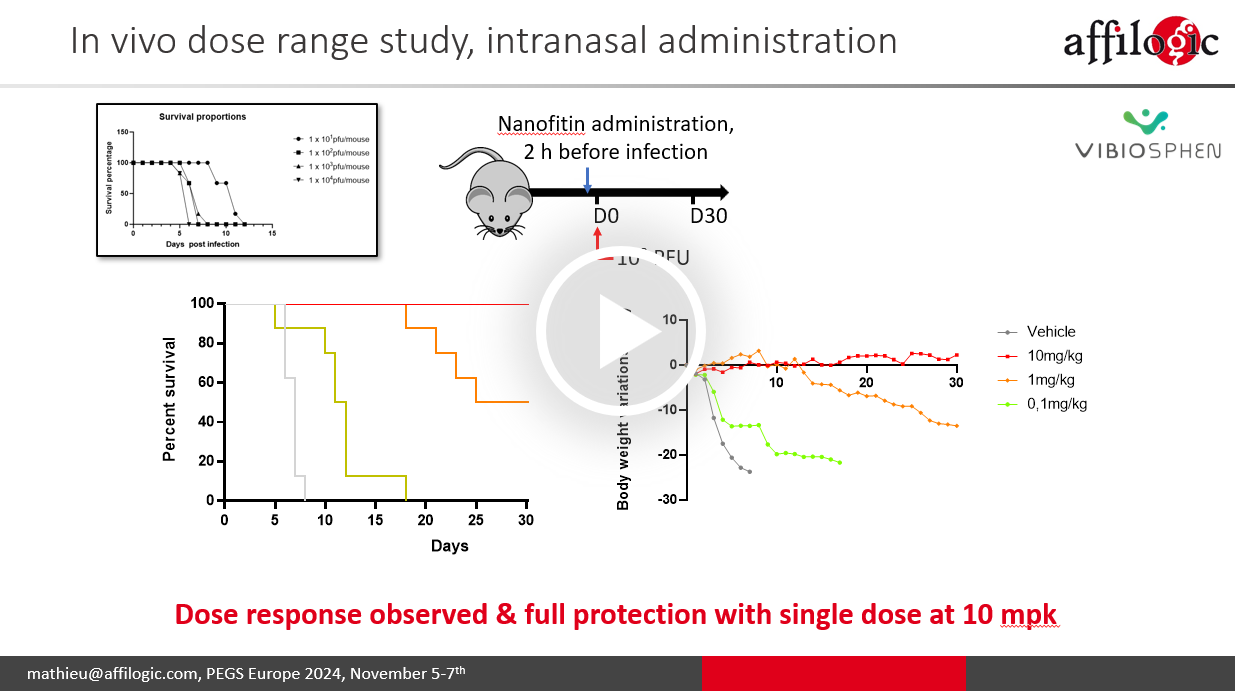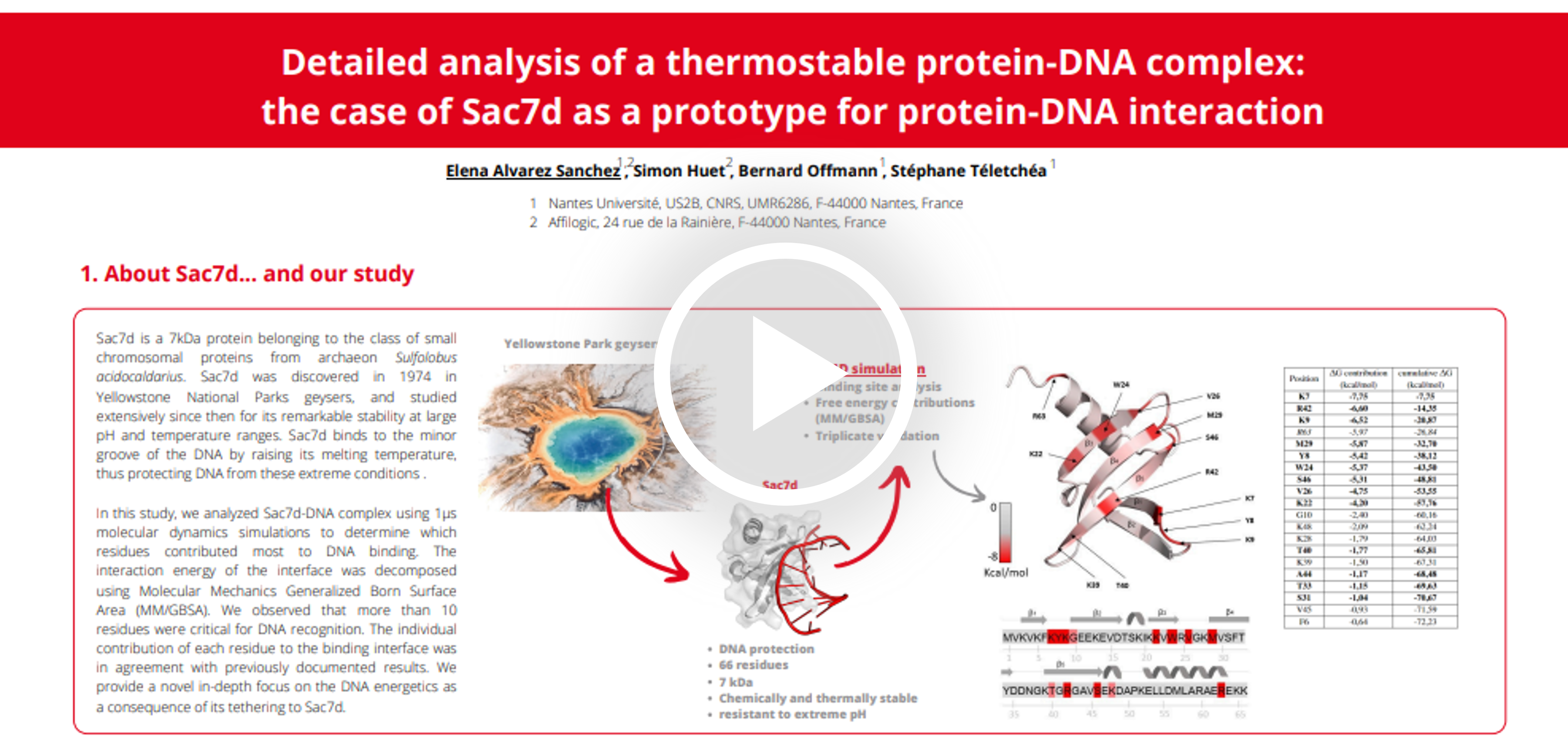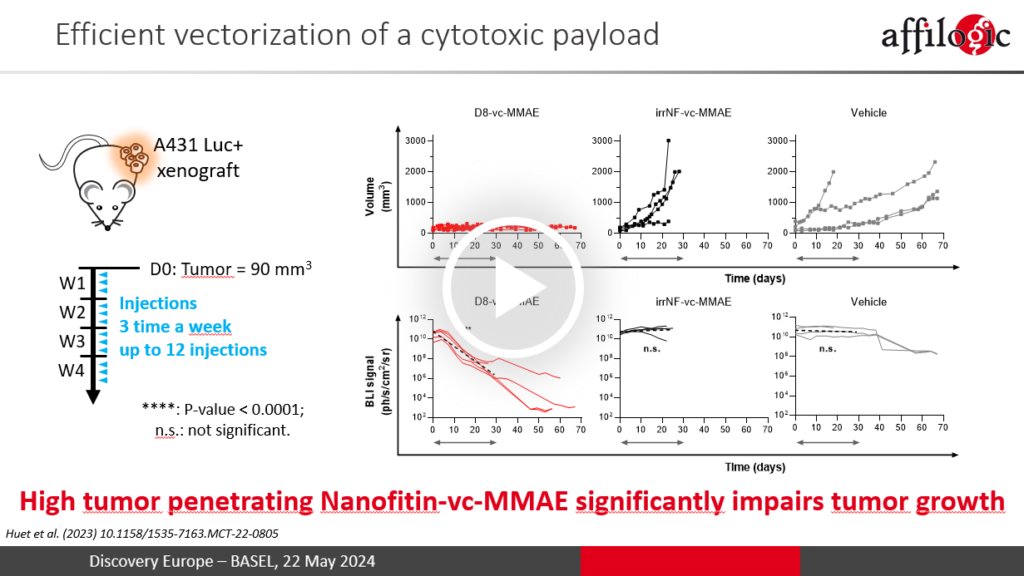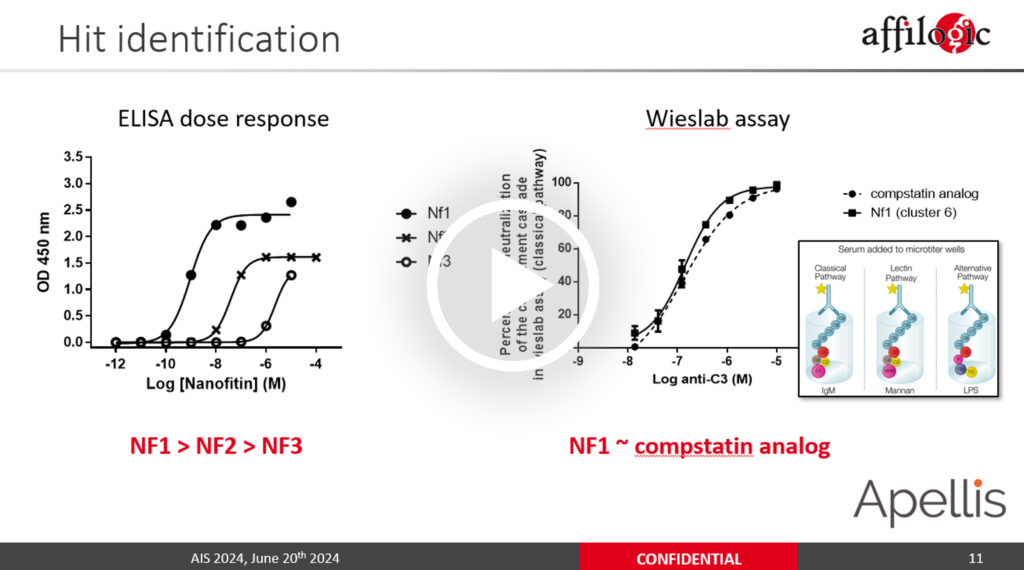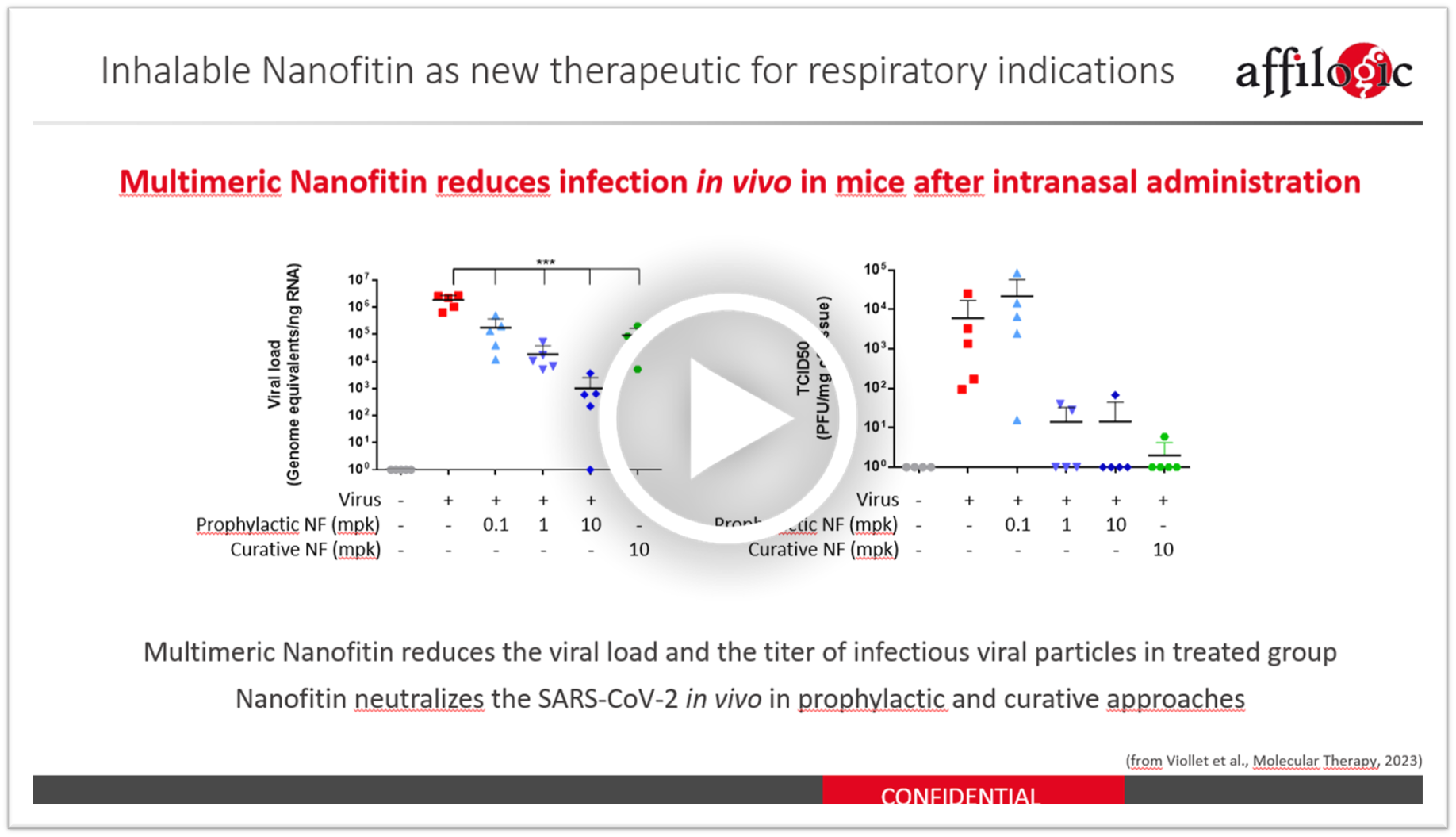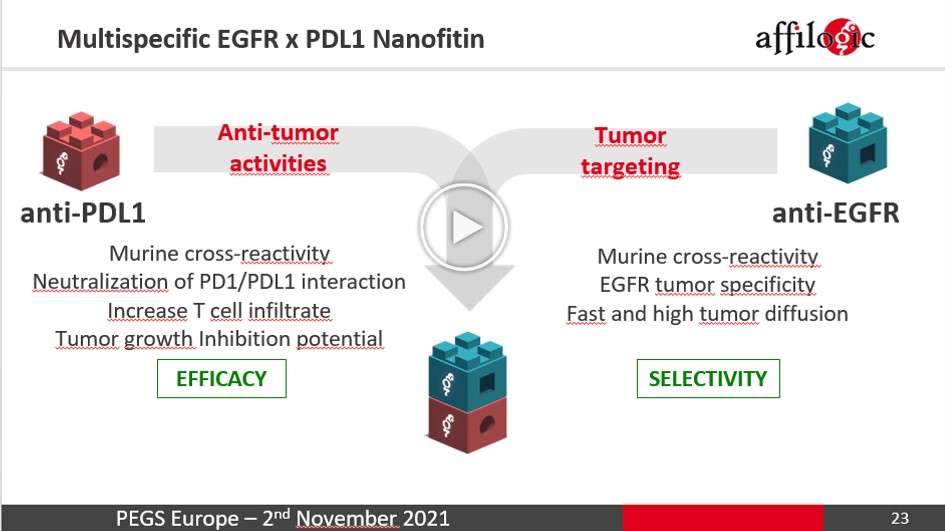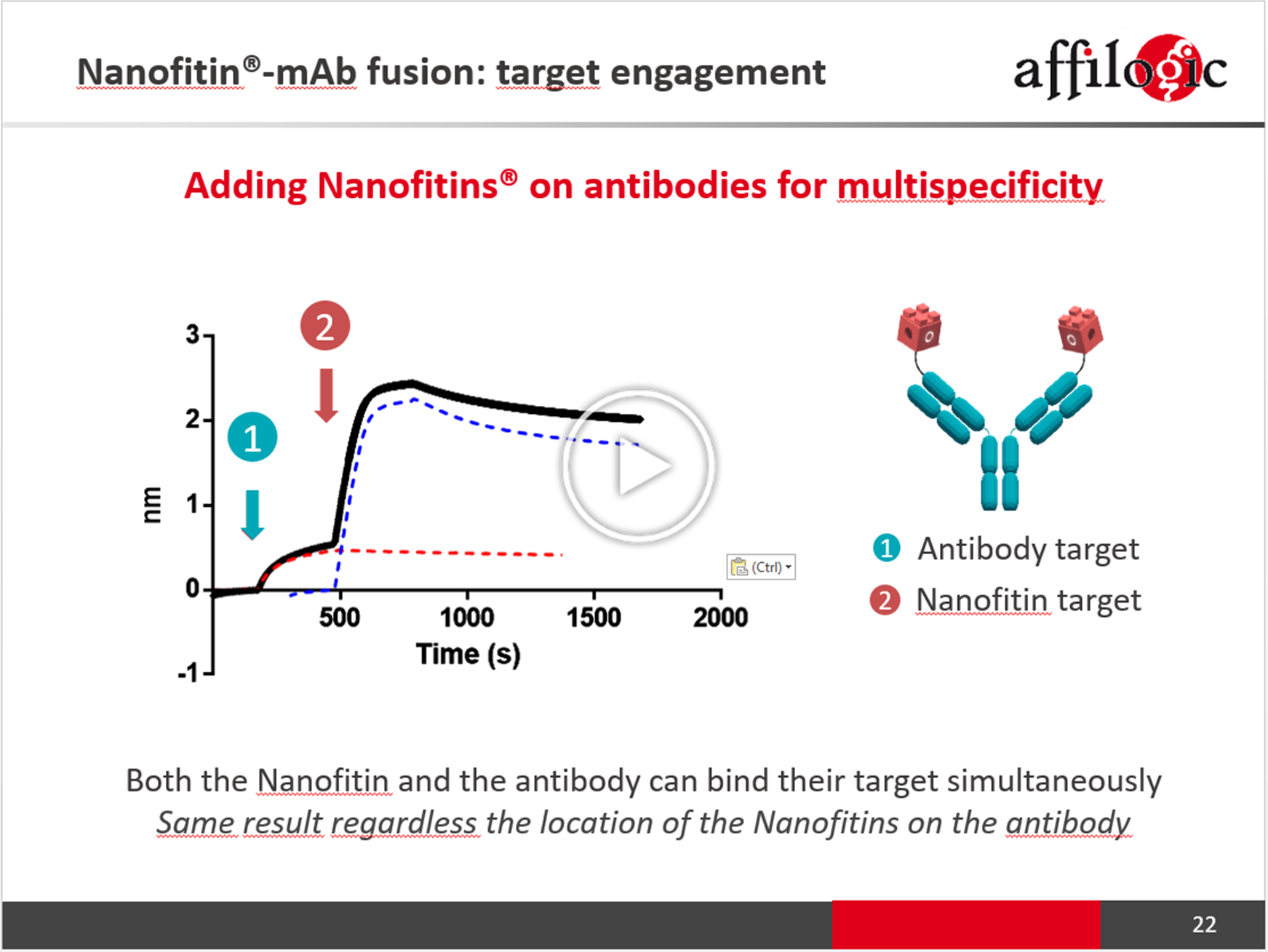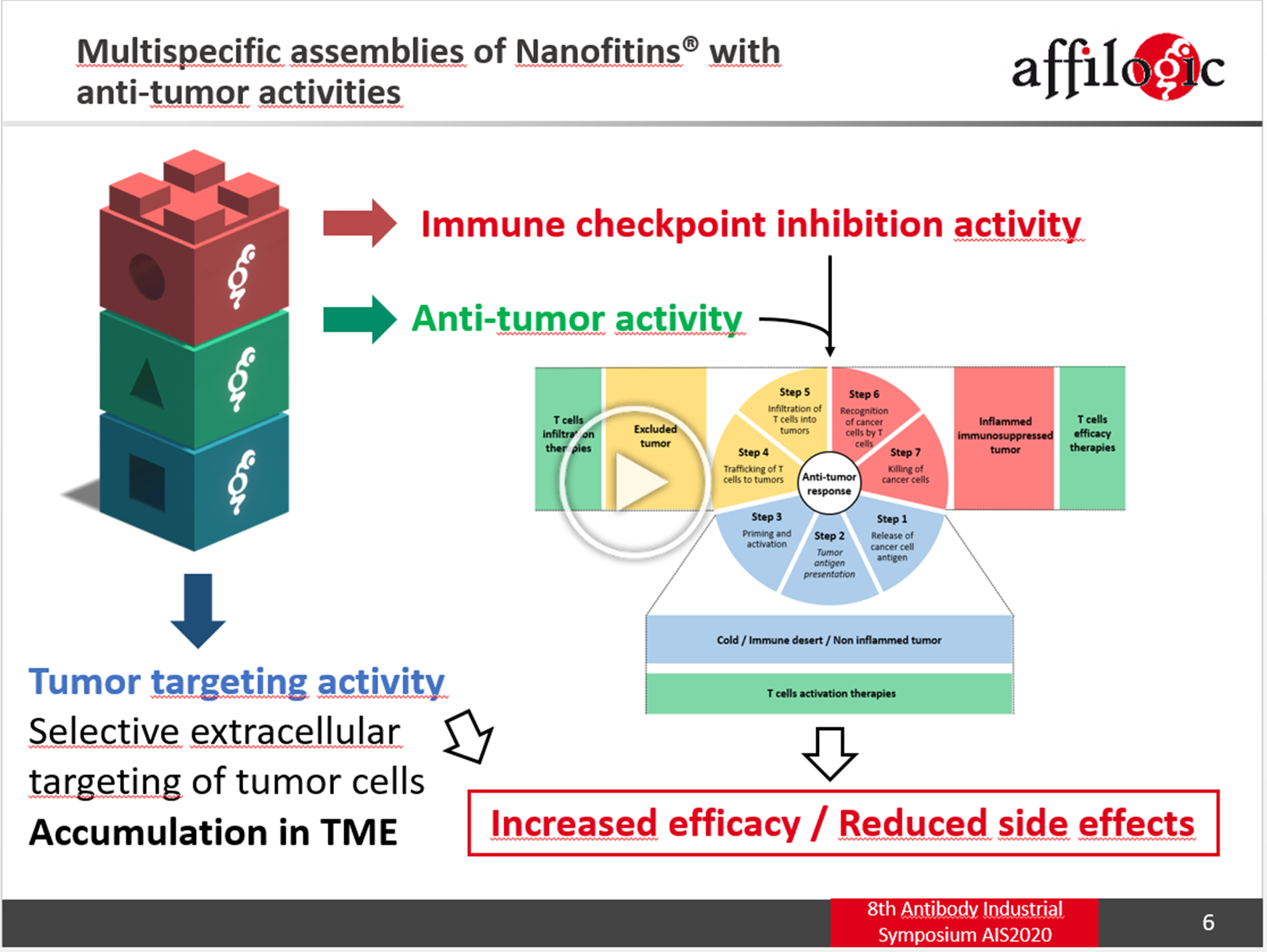Curing emerging infectious diseases with a Nanofitin®-based therapeutic approach @PEGS Europe 2024
Mathieu Cinier to present Affilogic’s program in infectious diseases
The past five years have shown pressure on the development of therapeutic platforms enabling both rapid drug candidate generation and broad-spectrum activity to minimise treatment escape upon adaptation of the pathogens. We have been demonstrating that the Nanofitin alternative scaffold generation platform allows for the generation of therapeutic candidates of high neutralisation potential in roughly 100 days, and can be amenable to local treatment in the case of pulmonary diseases.
For more information contact us or click here
Detailed analysis of a thermostable protein-DNA complex: the case of Sac7d as a prototype for protein-DNA interaction
Elena Alvarez Sanchez to present a poster on molecular dynamics simulations on Nanofitins/DNA interaction.
For more information contact us or click here
Nanofitins® for potent drug-conjugates with fast tumor penetration and systemic clearance @Discovery Europe 2024
Simon Huet to present latest data on our Oncofitin Drug Conjugate program.
The very rapid diffusion of the Nanofitins® within the whole tumor due to their small size represents a core advantage over other vectoring agents, as it can deliver cytotoxic payloads on a more targeted manner. Notably, this size also allows non-engaged Nanofitins® to be rapidly cleared, highly reducing side effects observed with other vectoring solutions such as “on target off tumor”.
Here we present tumor growth inhibition activity of anti-EGFR Nanofitins® coupled to MMAE in xenografted mice.
For more information contact us or click here
APL-1030, a Novel High-Affinity Nanofitin® Inhibitor of C3-Mediated Complement Activation @AIS 2024
Mathieu Cinier to present the development of APL10-30, an anti-C3 Nanofitin® product designed to treat complement pathway related pathologies.
Alternative scaffold technologies such as the Nanofitins have the potential to expand further the scope of targeted biologics, in addition to what is already explored with antibodies and derivatives (fragments and multispecifics). With respect to complement associated diseases, the neutralizing antibody targeting C5 (Eculizumab) was found poorly active in Age-Related Macular Degeneration (AMD) and cannot be addressed directly to the brain to treat central nervous system (CNS) related diseases. In contrast, APL-1030, a Nanofitin®-based C3 inhibitor has been rationally design to inhibit the complement cascade and be amenable for the treatment of AMD as well as other complement related pathologies.
For more information contact us or click here
Inhalable Nanofitin® as new therapeutic for direct application in respiratory tract
@I4ID 2023
Sébastien Viollet to present latest datas published on mulitmerci Nanofitins® used as anti-virals directly delivered into the lungs at I4ID.
Nanofitins® are easy to combine with each other, to generate a multispecific molecule. This approach is of particular ineterest to target multiple epitopes of a therapeutic target on viruses, especially when they present a high mutational profile. Here, we show how a tetrameric molecule of 4 different Nanofitins® targeting 4 different epitopes of the Spike protein, significantly reduces SARS-CoV-2 infection into mice lungs, once nebulized/turned into a powder, and delivered by intranasal route.
For more information contact us or click here
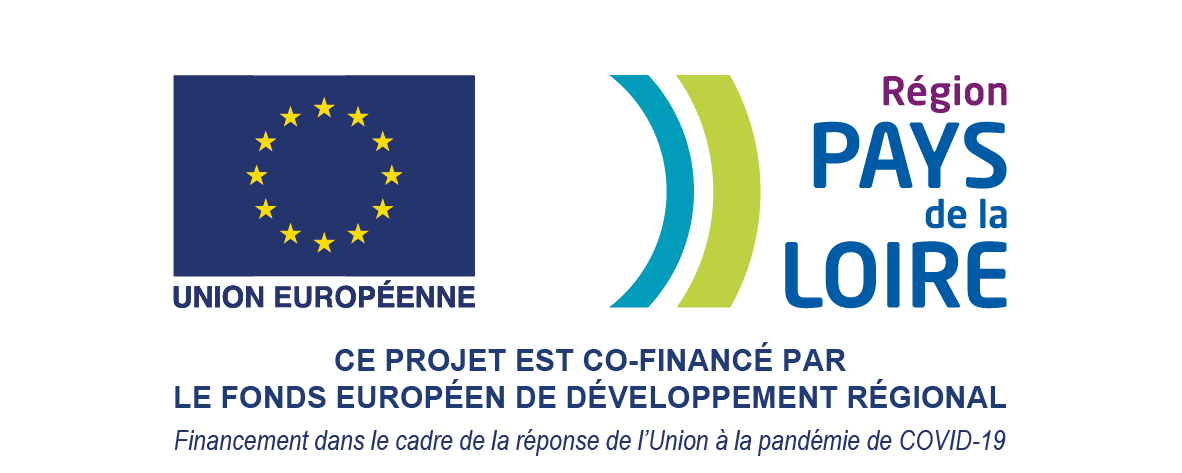 Part of the activities were sponsored by (i) the French Government in the “Programme d’Investissements d’Avenir” and “France Relance” via BPI France and (ii) the European Regional Development Fund (FEDER – React EU the European Union addressing the COVID-19 pandemic) via the Region Pays de Loire
Part of the activities were sponsored by (i) the French Government in the “Programme d’Investissements d’Avenir” and “France Relance” via BPI France and (ii) the European Regional Development Fund (FEDER – React EU the European Union addressing the COVID-19 pandemic) via the Region Pays de Loire
One scaffold, several approaches: tackling cancer diseases with Nanofitins® @PEGS2022
Mathieu Cinier to present a poster showing latest data of Nanofitin® used as cancer targeted therapies. Nanofitins® display multiple specifications making them very attractive as alternative scaffolds. More specifically, they show fast and deep tissue penetration, thanks to their small size, and easy conjugation for multispecific assembly. Moreover, it is very easy to conjugate them to other payloads, like radionuclides, cytotoxics …
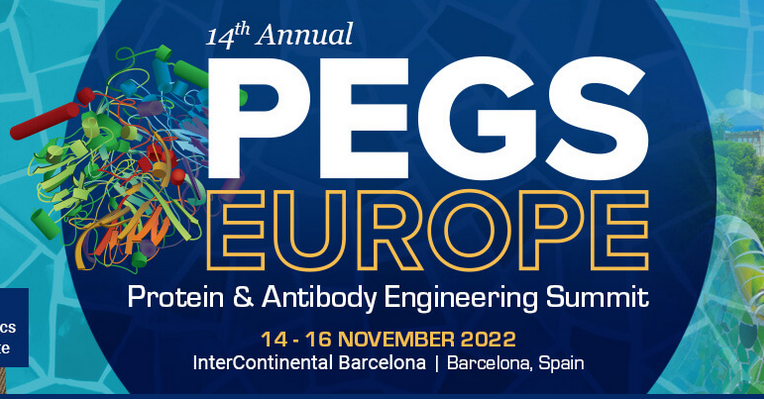
For more information contact us or click here
Development of multispecific assemblies of Nanofitins® with anti-tumor activities @ PEGS Europe 2021
Ms. Perrine Jacquot, Ph.D. student working at Affilogic and at the Western Cancer Institute (Institut de Cancérologie de l’Ouest, Saint-Herblain, France) presented her latest results in November in Barcelona during PEGS Europe 2021. Nanofitins® are small and robust affinity proteins considered as alternatives to antibodies. These proteins can easily be associated with each other in order to increase avidity or multi-specificity. In the development of anti-tumor strategies, the assembly of Nanofitins® with various activities (targeting of receptors / soluble factors, recruitment of immune cells, etc) allows the targeting of multiple pathways involved in cancer progression and aims at the development of an effective anti-tumor response with limited toxicities.
 This project was partially sponsored from January 2018 to December 2020 by a grant from the European Regional Development Fund (ERDF / FEDER) via the Region Pays de Loire.
This project was partially sponsored from January 2018 to December 2020 by a grant from the European Regional Development Fund (ERDF / FEDER) via the Region Pays de Loire.
For more information contact us or click here
Nanofitin®-Antibody fusion as a novel multispecific platform: providing extra specificities while maintaining developability
Webinar Oxford Global, June 2019
Building on antibody expertise, many different bispecific formats have been engineered to allow the additional neutralization of an escaping pathway or the recruitment of effectors, but often at the expense of the overall physico-chemical properties of the biologic itself compared to the actual state of the art for monoclonal antibodies. Nanofitin-Antibody fusion is proposed as a novel multispecific platform, whereby additional targeting specificities are provided by the fusion of Nanofitins to existing antibodies without altering their initial physico-chemical properties.
Nanofitin is a small (7 kDa) single chain, hyperstable, cysteine-free, and highly soluble alternative scaffold that can be custom-engineered for a defined targeting specificity. Nanofitins are easily assembled with each other or with third-party molecules such as antibodies by simple, rapid and proven methods to design an ideal targeted molecule. With the strong rational behind the targeting of multiple disease pathways, the trend is moving smoothly from the design of bispecific to multi-specific antibodies, which could be easily adapted with Nanofitins. Thanks to their small size, Nanofitins can be plugged on an antibody at different locations, either as a single module or as an assembly, while still providing a minimal hindrance on the antibody that retain its functionality. Resulting Nanofitin-Antibody fusions benefit from the high stability and solubility of the Nanofitin scaffold, providing to the Nanofitin-based multi-specific platform a developablility advantage.
For more information contact us or click here
Development of multispecific assemblies of Nanofitins® with anti-tumor activities @ the 8th Antibody Industrial Symposium 2020
Digital, November 2020
Affilogic is developing a new anti-cancer therapeutic approach. Different multispecific assemblies of Nanofitins are developed with a variation of the modules that compose them. In order to potentiate the anti-tumor response, the choice of Nanofitin modules to assemble focuses on those with activities involved in cancer synergistic signaling pathways. In the development of multispecific anti-tumor proteins, Nanofitins provide several advantages. Indeed, thanks to their good tolerance to engineering modifications as well as the non-involvement of their N- and C-terminal ends in the binding, their multimerizations with other molecules / proteins / toxins / antibodies and Nanofitins are facilitated and used in order to do multi-targeting and/or increase avidity. Moreover the robustness of these proteins limits the possibilities of their deactivation in the presence of an aggressive tumor environment. In addition, the absence of cysteines and post-translational modifications allows the production in prokaryotic system of several Nanofitins grouped in a single molecule, which will bring an attractive cost in the multimers development. Finally, their low molecular weight promotes their diffusion within the tumor mass and gives them a short plasma half-life allowing the elimination in a few minutes of unbound proteins which is interesting for reducing side effects.
 This project was partially sponsored from January 2018 to December 2020 by a grant from the European Regional Development Fund (ERDF / FEDER) via the Region Pays de Loire.
This project was partially sponsored from January 2018 to December 2020 by a grant from the European Regional Development Fund (ERDF / FEDER) via the Region Pays de Loire.
For more information contact us or click here

